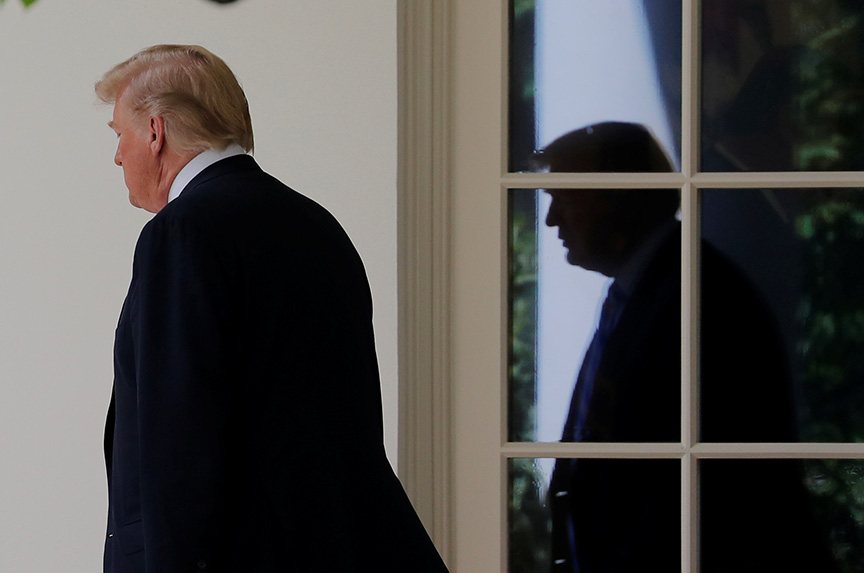 So, this is how the world looks when President Trump follows his gut.
So, this is how the world looks when President Trump follows his gut.
This is what you get when the president has top advisers who do more to channel his energies (doing deals, righting trade wrongs, unraveling the Obama years) than to challenge his worst instincts (punish ungrateful allies, obsess on trade deficits, mistake tactics for strategy).
As it is with so many recent weeks, it’s impossible to forecast the outcomes of Trump’s restless risk-taking. However, last week’s potentially historic moves deserve closer scrutiny, to underscore the wild range of possibilities.
Trump’s trade actions against European allies, Canada and Mexico underscored the very worst possibilities of a trade conflict that has far more costs than benefits for the United States, both economically and geopolitically. Following his departure from the Iran nuclear deal and earlier from the Paris climate agreement, it’s hard to recall a time since the Iraq war when relations with Europe have been so strained.
By contrast, President Trump’s “go” decision for the June 12 Singapore summit with North Korea, following his earlier letter to North Korea’s leader that walked away from the meeting, keeps in play the chance of a historic breakthrough that would serve just about everyone. It’s a long distance from here to a deal that would involve a complex sequence of economic incentives and denuclearization moves all sides could accept, but “game on!”
On trade, even the administration’s toughest critics concede President Trump’s right that many of our global agreements are insufficient. When it comes to China, it’s worth celebrating a commander-in-chief finally willing to take on legendarily unfair trade practices and intellectual property violations.
However, last week’s moves to impose steel and aluminum tariffs on Europe are counterproductive. First, they put us at war with European allies at a time when we need them on our side to apply greater pressure on China. Second, the tariffs will increase US consumer costs as most manufacturers won’t have alternative domestic suppliers at lower cost. And even if Europe in the end agrees to lower barriers to US-made cars, there is no guarantee they’ll buy American as US manufacturers already produce vehicles in European factories that better suit market tastes.
Third, Europe’s threatened retaliatory measures are aimed at specific products in specific regions – Harley-Davidsons from House Speaker Paul Ryan’s Wisconsin, Bourbon whiskey from Senator Mitch McConnel’s Kentucky – that will hurt US business in what appears to be politically targeted manner. American farmers are particularly at risk. Finally, and this is most troubling, President Trump has used a national security argument to punish our allies, NATO allies committed under treaty to common defense, by employing Article 232 of the Trade Expansion Act of 1962.
This undermines consistent US efforts over time to narrow the national security arguments that can be employed to protect foreign markets from American goods. With these floodgates open, what’s to stop India from arguing that it must keep out US food products on national security grounds? Consider all the areas that China might foreclose due to spurious national security concerns.
One tends to overreact at times to President Trump’s isolated tactics, not realizing that he has the real estate mogul’s instincts of using them to increase his leverage at every stage of the negotiating process. What one should watch now is whether President Trump can turn this leverage into reasonable outcomes Europeans can accept and that don’t damage our alliances. He failed to do so regarding Iran, though before he withdrew from the deal his negotiators had come some distance in getting Europe on board in tougher measures against Tehran’s ballistic missile developments and errant regional behavior.
On North Korea, thus far President Trump deserves more credit than criticism, having brought the North Koreans to the table through abandoning a failed policy of “strategic patience” for a mixture of maximum pressure sanctions tactics, real military threats and openness to provide the one-on-one meeting with an American leader that North Korea’s leaders have always coveted.
During my recent trip to Seoul, South Korean officials laid out their arguments about why they thought North Korean leader Kim Jong-un had made a strategic choice to denuclearize that was worth testing. They argued that he no longer believed he could develop his country economically and secure his own leadership except through denuclearization steps.
There’s plenty of reason to approach these talks with skepticism, given historic experience and present dangers. Yet, there’s also sufficient cause to more fully test this South Korean theory that Kim Jong-un’s change of heart might provide what one of my South Korean hosts called “the opportunity of the century” to bridge the world’s most dangerous remaining divide.
What’s difficult to swallow for President Trump’s most ardent supporters is that he is acting against American interests in his trade conflict with Europe. What’s impossible to accept among his many opponents is that he is serving global interests in pursuing a historic deal with North Korea.
Yet both may be true. The table is set for a summer of drama on both fronts.
Frederick Kempe is president and chief executive officer of the Atlantic Council. You can follow him on Twitter @FredKempe. This blog post is based on his weekly InflectionPoints newsletter. Read the newsletter in full here.
Image: US President Donald J. Trump departed the White House in Washington for a weekend trip to the Camp David presidential retreat in Maryland on June 1. (Reuters/Carlos Barria)
